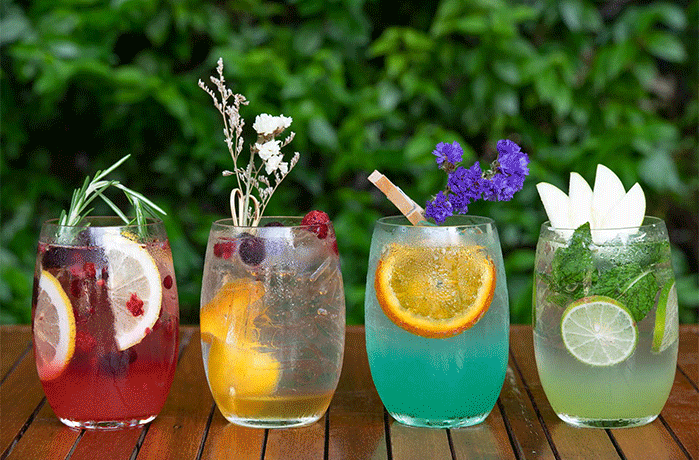In April 2020, during the early stages of the pandemic, Ina Garten captured the moment. She posted a video on Instagram to show how she was holding up at home during quarantine: by making the perfect large batch of Cosmos, served all at once to herself in a gigantic martini glass.
Garten wasn’t drinking alone. According to a study by the National Library of Medicine, an organization within the National Institutes of Health, many people who were impacted by the pandemic began to drink significantly more alcohol than prior to the outbreak.
However, as the pandemic progresses, a counter-phenomenon has cropped up. This year, across the globe, 58% of those who drink alcohol are increasingly opting for non- and low-alcoholic cocktails, according to the Bacardi Cocktail Trends Report for 2022.

Javelle Taft, head bartender at Death & Co., a cocktail bar in New York City, has observed this evolution firsthand.
“Americans are known, in general, for over-imbibing,” says Taft. “Before the pandemic, you’d just kind of go into rowdy bars and have some drinks, and you were there to have a good time.”
Now, Taft says, people are more interested in beverage culture overall. Demand for Death & Co.’s cocktail classes has ballooned, he says, and this new wave of patrons is fully tuned in to the cocktail making process. They often want to consume less alcohol in each cocktail and instead try different types of drinks in a given outing.
“These guests tell us that, before the pandemic, they didn’t really drink cocktails, but then they stumbled upon our book and started making drinks for themselves,” says Taft. “Their general knowledge of what a balanced drink should taste like wasn’t nearly as good as it is today. The way people are drinking and imbibing is changing and it’s becoming more sophisticated.”
Death & Co.’s menu now features over half a dozen low-alcohol cocktails, and plans are underway to add an entire section of low-alcohol drinks to the cocktail list.
“People are being made comfortable coming to an establishment and ordering something non-alcoholic, and they’re still being treated like an adult.” —Dave Arnold, Museum of Food and Drink
Dave Arnold, founder of the Museum of Food and Drink, believes the pandemic led many people to ask themselves what they’re drinking and if they should drink as much as they do.
“In the pandemic, a lot of people shifted into over-consumption,” says Arnold. “I think a lot of them are now correcting, and I think that can be very positive.”
The contemporary non-alcoholic movement is substantially different from previous temperance movements in American culture, Arnold notes, due to its lack of prescriptivism. Unlike early 20th-century temperance and Prohibition, the modern non-alcoholic movement is more about options and individualization than widespread moralizing.
“Now, most of what’s happening is people are being made comfortable coming to an establishment and ordering something non-alcoholic, and they’re still being treated like an adult,” says Arnold.

Boisson is a dedicated non-alcoholic retailer that opened in the Cobble Hill neighborhood of Brooklyn, New York, in February 2021. Cofounders Barrie Arnold and Nick Bodkins believed that people were interested in drinking less alcohol and needed a place to buy quality non-alcoholic items from a smart, intentional selection akin to a boutique wine shop.
After a single year of business, Boisson expanded to five locations across New York City and has announced plans to expand to other destinations nationwide.
“We’re on a mission to help people change the way they celebrate and enjoy the special moments in their lives,” says Bodkins. “Starbucks doesn’t look at you funny when you order a decaf coffee. I think that non-alcoholic options, especially when they’re incredibly well-curated, should have that same experience for people when they walk into a liquor or wine store, and speak to someone who really understands the product and what they’re talking about.”
“Starbucks doesn’t look at you funny when you order a decaf coffee.” —Nick Bodkins, Boisson
Quarantine led many people to reflect on their habits, including, in some instances, their casual drinking, says Bodkins. He believes that what people actually enjoy about going to bars or fixing cocktails at home isn’t necessarily alcohol.
“What people have really started to understand about their own behavior is that what they’re actually really enjoying is the social experience,” says Bodkins. “It’s not necessarily that they enjoy the alcohol, it’s that they enjoy being together, celebrating and relaxing.”
Last Updated: September 28, 2022















